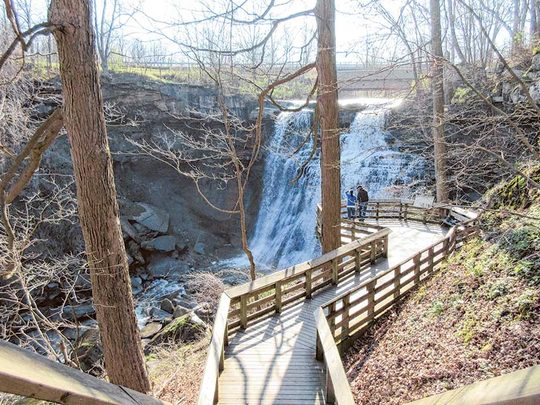
It’s America’s 11th most-visited national park, but it’s also a place many people have never heard of: Cuyahoga Valley National Park in Ohio.
Nearly 2.3 million people visited Cuyahoga in 2015, putting it right behind better-known parks like Glacier National Park in Montana and Acadia National Park in Maine. But if you’re not from Ohio or nearby, you’d be forgiven for knowing a lot less about Cuyahoga than you do about Grand Canyon or Yellowstone.
And while Cuyahoga doesn’t have the dramatic features that typically draw visitors to national parks ‑ no volcanoes, glaciers or geysers here ‑ it does offer something that can be hard to find: an opportunity to immerse yourself in nature just minutes from densely populated cities.
A great blue heron fishes in the Cuyahoga River. AP
“We’ve got this amazing, peaceful, beautiful area carved out and protected between these large urban areas, Cleveland and Akron,” said Deb Yandala, CEO of the Conservancy for Cuyahoga Valley National Park, which raises several million dollars a year for the park.
“I think when people hear ‘national parks,’ they think of the big Western parks,” she added. “But not everyone is going to get out to Yellowstone or Glacier or Zion. For us to have a national park right in our backyard is amazing. We are part of a new breed of parks, bringing national parks to urban populations.”
In general the park is both also extremely safe and heavily used, despite an incident in which a shooting victim was found in the park over the July Fourth weekend. Police described that as an isolated incident.
Cuyahoga Valley became a national recreation area in 1974 and a national park in 2000, so it’s one of the National Park Service’s newer parks. The park has 100 miles of trails across 33,000 acres, including 20 miles of a restored towpath, perfect for biking, that follows the Ohio & Erie Canal. (The towpath was originally laid as a pathway for horses or mules towing barges.)
Towpath trail along the Ohio and Erie Canal in Cuyahoga Valley National Park. AP
The park is also home to restored historic farms and a large farmers market, both connected to the Cuyahoga Valley’s history as an agricultural region supplying food to Cleveland and Akron. Other activities and attractions include concerts, a historic railroad that offers scenic tours and a variety of other programmes. The park is often mentioned as a top spot for fall foliage, and one of its loveliest spots is Brandywine Falls, a 65-foot-tall waterfall easily reached from a parking lot via a wooden walkway.
But Cuyahoga has not always been associated with outdoor recreation and scenic beauty: The river was so polluted in the 20th century that it repeatedly caught fire, including two major fires in 1952 and 1969. News coverage of the 1969 blaze helped spur cleanup efforts.
“We’re now doing kayaking on the Cuyahoga River, which would have been unheard of years ago,” said Yandala.
If You Go...
Free admission. The Conservancy for Cuyahoga Valley National Park lists 100 things to do at conservancyforcvnp.org. Depending on route and destination, you can reach the park in 20-30 minutes from downtown Cleveland. nps.gov/cuva
Brandywine Falls are located at 8176 Brandywine Road, Sagamore Hills Township, Ohio, near exit 147 from I-77 South.













